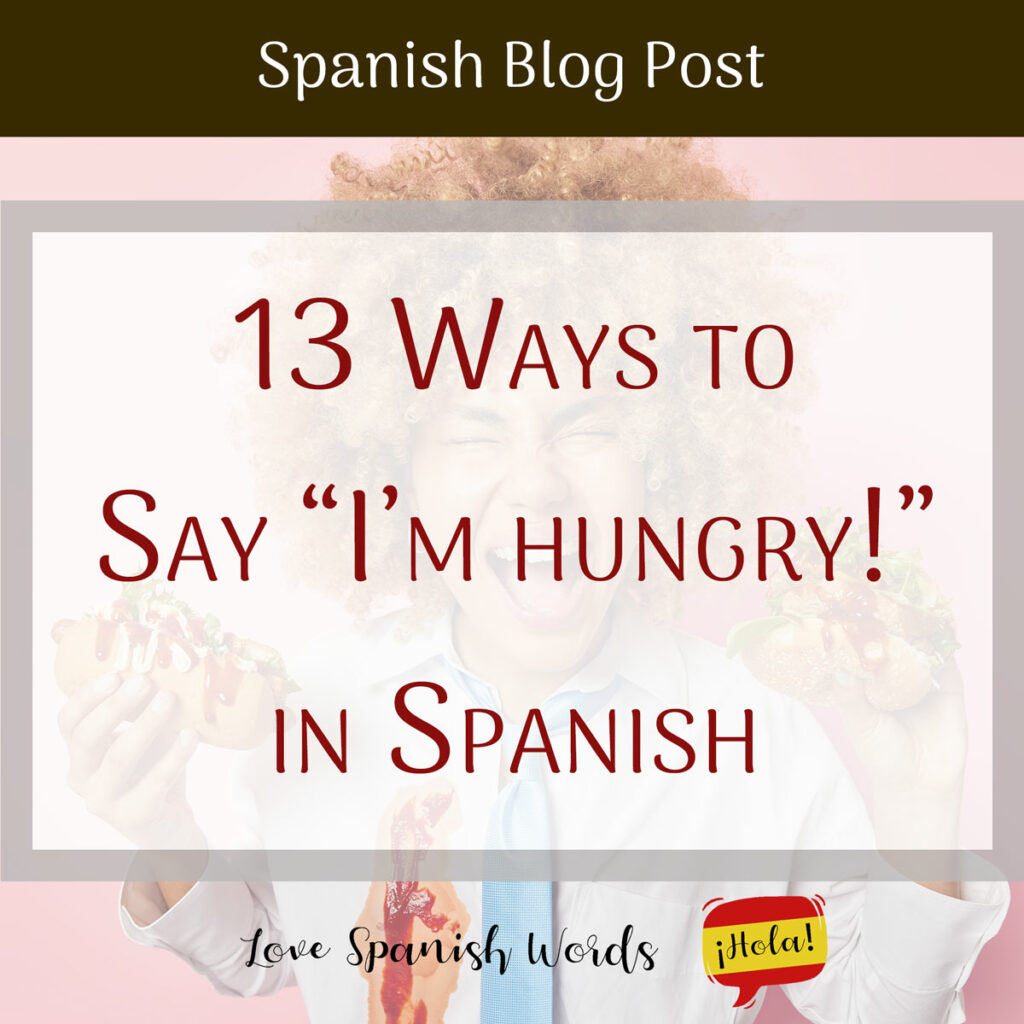Being able to express your hunger in Spanish is important, especially if you are planning to travel to or live in a Spanish-speaking country! Whether you’re in a casual setting with friends or a more formal environment, knowing how to communicate your need for food can be done in various ways. If you’re hungry, you can say it simply or get creative with humorous and unique expressions. Today, we’ll explore different ways to engage in conversation and let others know you’re hungry.

Tengo hambre
Tengo hambre is the most basic way to communicate that you are hungry. This expression is universally understood in all Spanish-speaking countries and can be used in any context, whether casual or formal. You might use it at home, work, in a restaurant, or while hanging out with friends. It’s an essential phrase to know so you can express hunger no matter where you are.
No comí nada en el desayuno, así que tengo mucha hambre.
I didn’t eat anything for breakfast, so I’m very hungry.
Me muero de hambre
If you want to emphasise your hunger in a dramatic way, you can use the phrase Me muero de hambre. This phrase indicates extreme hunger and is the equivalent of I’m starving although the literal translation is I’m dying of hunger. It suggests that your hunger is urgent and unbearable. The phrase is used informally in more casual conversations with friends and it’s mostly used after going a long day without food.
¡Muero de hambre! No he comido en todo el día.
I’m starving! I haven’t eaten all day.

Muero por un bocado
Similar to the above statement, Muero por un bocado emphasises how hungry you are. Instead of saying I’m dying of hunger, this statement translates to I’m dying for a bite (of food or a snack). You can leave the phrase as is, or mention a specific food you crave such as spaghetti. It’s often used when talking about a shared meal such as cake, or when you want to take a sneaky bite of someone’s food.
Muero por un bocado de este pastel.
I’m dying for a bite of this cake.
El hambre me está matando
This phrase translates to The hunger is killing me. It suggests an unbearable hunger and a strong urgency to eat. It can be used in casual settings to stress your need for food in an exaggerated manner.
El hambre me está matando. ¿En cuánto tiempo estará lista la cena?
The hunger is killing me. How long will it take for dinner to be ready?

Quiero comer
Quiero comer translates in English to I want to eat. This is a more direct way of communicating your hunger. The phrase can be used to communicate you want to eat at that precise moment because you are hungry or when you want to address future breakfast, lunch, or dinner plans. To address future meal plans, you should add the what or where you want to eat. For example, Quiero comer pizza y alitas de pollo para la cena describes what you want to eat. The translation is I want to eat pizza and chicken wings for dinner.
Esta noche quiero comer tacos de carne asada.
Tonight I want to eat roast beef tacos.
Tengo ganas de comer
Tengo ganas de comer translates to I’m in the mood to eat. It’s used similarly to the above phrase Quiero comer. You can use it to indicate you want to eat now or to talk about the future by adding the what or where. For example, Hoy tengo ganas de comer comida Tailandes. (Today I’m in the mood to eat Thai food.)
Tengo ganas de comer un helado, ¿vamos?
I feel like eating ice cream. Shall we?

Estoy hambriento/a
The word hambriento/a is both an adjective and a noun. As an adjective, it translates to hungry. You use the estar verb in front. For example, Estoy hambriento (I’m hungry). As a noun, it refers to a person who is hungry. You use the ser verb in front. For example, Soy hambriento (I’m a hungry person). Using this expression indicates a serious need for food and that you are starving.
Estoy hambriento. No puedo esperar para comer.
I’m starving. I can’t wait to eat.
Tengo el estómago vacio
Tengo el estómago vacio is a way to express your need to eat. It translates to My stomach is empty. This is a great phrase to use in both casual and formal conversations as a practical way to express hunger.
No puedo concentrarme. Tengo el estómago vacío.
I can’t concentrate. I have an empty stomach.

Me rugen las tripas
The Spanish version of my My stomach is growling is Me rugen las tripas. However, in Spanish, it doesn’t use the word stomach. Rather it uses tripas which are the intestines or guts. The literal English translation is My intestines are growling. This phrase describes the sound your stomach makes when you’re hungry. It is an informal and fun way to express your hunger to friends.
Me están rugiendo las tripas. ¡Es hora de almorzar!
My guts are growling. It’s time for lunch!
Me estan sonando las tripas
Similarly, Me están sonando las tripas translates to My intestines are sounding instead of growling. Both of these phrases are used to signal your need for food in an amusing and light-hearted way.
No he comido desde la mañana. Me están sonando las tripas.
I haven’t eaten since this morning. My stomach is rumbling.

Estoy en modo hambre
Estoy en modo hambre translates to I’m in hunger mode. When using this phrase it signals that you are hungry now and you’re distracted by your hunger. This expression is informal and great to use with friends when hunger strikes.
Estoy en modo hambre desde que desperté.
I’ve been in hunger mode since I woke up.
Me comería una vaca entera
This phrase is a more humorous way to express intense hunger. The literal English translation is I could eat a whole cow. This exaggeration suggests you could eat a massive amount of food because you are extremely hungry. It can be said after a long day of not eating and is a more relatable and playful way to express yourself.
Tengo tanta hambre que me podría comer una vaca entera.
I’m so hungry I could eat a whole cow.
Estoy que me como un caballo
Estoy que me como un caballo is another humorous expression to suggest extreme hunger. Instead of a cow, this phrase uses a horse. The English translation is I’m about to eat a horse, indicating that you could eat an entire horse or something as large as a horse. This dramatic phrase is often used informally with friends and family.
Después de el maratón, estoy que me como un caballo.
After the marathon, I’m about to eat a horse.

